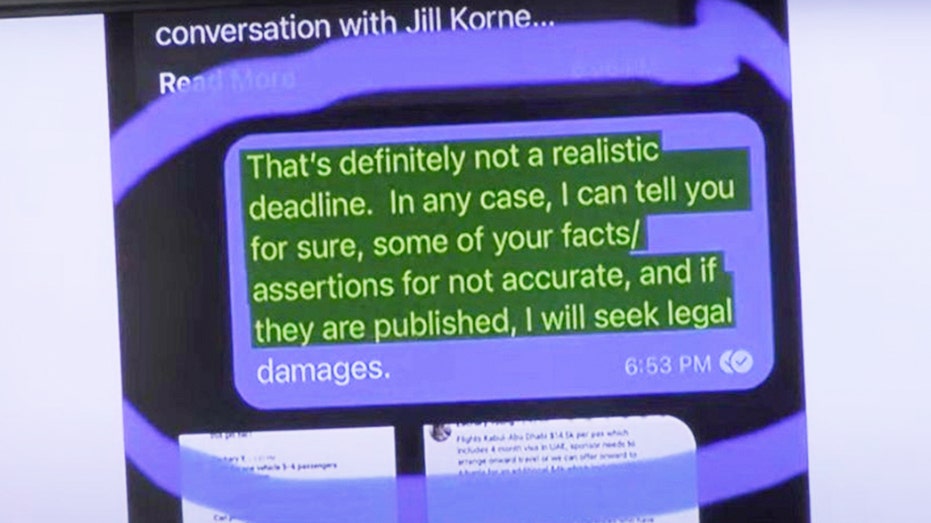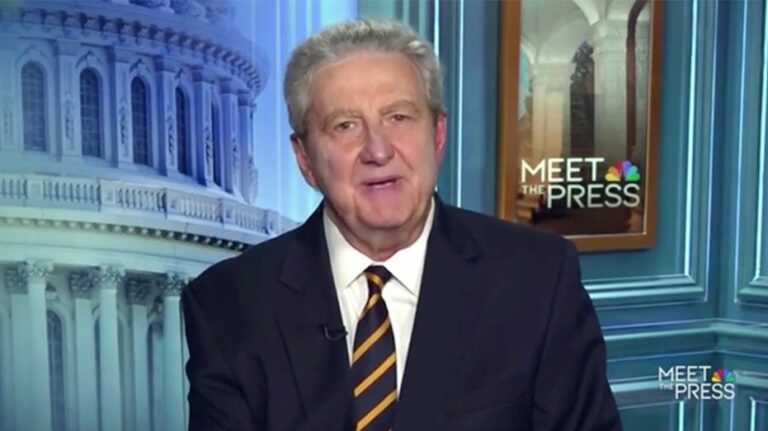
PANAMA CITY, FLORIDA — The Navy veteran suing CNN for defamation warned CNN correspondent Alex Marquardt that his 2021 story about him was “inaccurate” and he would “seek legal damages,” according to text messages that were shown to jurors on Wednesday.
Zachary Young said during his second day on the witness stand that he initially thought CNN needed help evacuating its own people from Afghanistan, and he reached out because he thought CNN was interested in his services because staffers viewed his LinkedIn page. He testified that once he realized that CNN reporter Katie Bo Lillis simply wanted to talk for a story, Young immediately told her that he didn’t want to be named in any reporting.
Young alleges that CNN smeared him by implying he illegally profited when helping people flee Afghanistan on the “black market” during the Biden administration’s military withdrawal from the country in 2021. Young believes CNN “destroyed his reputation and business” by branding him an illegal profiteer who exploited “desperate Afghans” during a November 11, 2021, segment that first aired on CNN’s “The Lead with Jake Tapper.”
According to text messages shown in court, Bo Lillis – the first CNN reporter Young engaged with — would not promise to keep his name out of the story. The messages showed Bo Lillis continued to press Young for a phone call about his evacuation efforts, and she insisted she just wanted background on the “lay of the land,” but Young responded that he doesn’t “adore attention.”
“I still prefer to not be named in any article as a condition of talking with you,” he wrote.
Bo Lillis then told Young his prices seemed “exorbitant,” and Young responded that he doesn’t expect Afghans to pay. Instead, Young told her that he was only focused on working with people who had sponsors or large corporations willing to pay to evacuate their people from the war zone.
According to the messages that captivated the jury, Young eventually told her bluntly that whoever tipped her off was pushing “slander” and he urged her to get her facts in order.
“The focus of your article seems pretty clear at this point. As you proceed, I would just appreciate if you would take the time to make sure you have your facts straight to avoid libel,” Young wrote.
Young testified that he would have called a lawyer “immediately” if he knew he was the focus of a story.
Marquardt, who went on to report the story at the heart of the lawsuit, then reached out to Young.
According to the messages, Marquardt then told Young he was working on a story that would detail his interactions with people inquiring about his services and asked if he preferred to chat about it via phone or text.
Young said he needed some time to properly respond, but Marquardt then said the story would run that afternoon.
“That is not a realistic deadline,” Young responded. “I will need a few days to review and provide comment. “
Marquardt insisted he had already called and reached out on LinkedIn the prior week, but Young testified he was not contacted by Marquardt. The CNN correspondent, who is expected to be called as a witness, then gave Young only two hours to respond to a series of questions.
“That’s definitely not a realistic deadline. In any case, I can tell you for sure, some of your facts/assertions are not accurate, and if they are published, I will seek legal damages,” Young responded to Marquardt.
Marquardt moved forward with the story anyway.
Jurors, who declined a brief recess because they wanted to keep listening, were then shown the now-infamous segment. They were also shown a pair of teasers that CNN anchor Jake Tapper used to promote the report.
Tapper first teased the 2021 segment at the center of the suit by warning CNN viewers of “desperate Afghans still trying to escape the country being preyed on by folks demanding that they pay up big time to get out.” Tapper later reminded viewers that the story on “desperate Afghans” being “preyed upon” was up next.
Once the segment began, Tapper said Marquardt found “Afghans trying to get out of the country face a black market full of promises, demands of exorbitant fees, and no guarantee of safety or success.”
Tapper tossed to Marquardt, who said “desperate Afghans are being exploited” and need to pay “exorbitant, often impossible amounts” to flee the country.
Marquardt then singled out Young, putting a picture of his face on the screen and saying his company was asking for $75,000 to transport a vehicle of passengers to Pakistan or $14,500 per person to end up in the United Arab Emirates.
“Prices well beyond the reach of most Afghans,” Marquardt said.
“In a text message, he told CNN that Afghans trying to leave are expected to have sponsors pay for them,” Marquardt said, adding that Young told the network evacuation costs are “highly volatile and based on environmental realities.”
Marquardt then said Young “repeatedly declined to break down the cost or say if he’s making money,” before playing a clip of an anonymous sympathetic man who couldn’t afford to have his family evacuated from Afghanistan.
Marquardt went back to Young, saying he received another text message.
“In another message, that person offering those evacuations, Zachary Young, he wrote, ‘Availability is extremely limited, and demand is high’… he goes on to say, ‘That’s how economics works, unfortunately,’” Marquardt told viewers.
Tapper responded, “Unfortunately, hmm,” before thanking Marquardt for the report.
No other people or companies were named other than Young.
CNN TURNS OVER INTERNAL DOCUMENTS AS PART OF HIGH-STAKES DEFAMATION SUIT
Young also testified that he has never met or interacted with the two different anonymous Afghans were interviewed during the CNN segment. They were concerned about their families stuck in Afghanistan and whether they could afford to evacuate them. Young said he never interacted with either man.
For much of the segment, CNN’s on-screen chyron stated: “AFGHANS TRYING TO FLEE TALIBAN FACE BLACK MARKETS, EXORBITANT FEES, NO GUARANTEE OF SAFETY OR SUCCESS.”
At one point during Young’s marathon testimony, he criticized CNN for thinking any war zone evacuation could guarantee safety or success.
Young’s attorney also had his client read dictionary definitions for “black market” to the jury.
“An illegal trade in officially controlled or scarce commodities,” one of them stated.
CNN FACES DEFAMATION SUIT OVER AFGHANISTAN WITHDRAWAL STORY: ‘EVIDENCE OF ACTUAL MALICE’
On Tuesday, jurors saw Young’s DynCorp contract that said he could not violate “black market” laws in his host country or else his contract would be terminated without severance. His contract was not renewed.
Throughout the testimony, Young and his attorney repeatedly pointed out that his face was visible during the CNN segment. This caused Young to have a “complete mental breakdown,” he told the jury.
“I went through a pretty bad time,” he said.
CNN HEADS TO COURT FOR HIGH-STAKES DEFAMATION TRIAL ABOUT AFGHANISTAN SEGMENT
Young teared up on the witness stand on Wednesday when explaining how the CNN report affected his personal life.
“I’m not the same person that my wife married. She never had to worry… knew that I was the provider, and I always would be,” Young said as he grew emotional on the stand, adding that he felt “like a total failure” since CNN aired its report about him.
Young, who said he is now on antidepressants and medication for sleep, said the entire ordeal has impacted intimacy with his wife.
“My libido is completely gone,” Young said.
“I don’t know if it’s the trauma or the medicine or both,” he continued. “My wife has been very understanding … I feel like I have just been completely destroyed, embarrassed and emasculated.”
Young’s wife was not present for the first three days of the high-stakes trial, and the Navy veteran said she’s taking care of her sick mother but was hoping to join him in Panama City during the second week of the trial.
CNN’s legal team then got its turn to cross-examine Young. Lead counsel David Axelrod, who bears the same name as CNN senior commentator David Axelrod, spent much of the time presenting his tax returns to the jury, questioning why Young deleted LinkedIn messages once the CNN report aired and peppering him with questions about his work history. The jury was sent home at 5 p.m. sharp and Axelrod’s cross-examination will continue on Thursday.
PANAMA CITY, FLORIDA — The Navy veteran suing CNN for defamation warned CNN correspondent Alex Marquardt that his 2021 story about him was “inaccurate” and he would “seek legal damages,” according to text messages that were shown to jurors on Wednesday.
Zachary Young said during his second day on the witness stand that he initially thought CNN needed help evacuating its own people from Afghanistan, and he reached out because he thought CNN was interested in his services because staffers viewed his LinkedIn page. He testified that once he realized that CNN reporter Katie Bo Lillis simply wanted to talk for a story, Young immediately told her that he didn’t want to be named in any reporting.
Young alleges that CNN smeared him by implying he illegally profited when helping people flee Afghanistan on the “black market” during the Biden administration’s military withdrawal from the country in 2021. Young believes CNN “destroyed his reputation and business” by branding him an illegal profiteer who exploited “desperate Afghans” during a November 11, 2021, segment that first aired on CNN’s “The Lead with Jake Tapper.”
According to text messages shown in court, Bo Lillis – the first CNN reporter Young engaged with — would not promise to keep his name out of the story. The messages showed Bo Lillis continued to press Young for a phone call about his evacuation efforts, and she insisted she just wanted background on the “lay of the land,” but Young responded that he doesn’t “adore attention.”
“I still prefer to not be named in any article as a condition of talking with you,” he wrote.
Bo Lillis then told Young his prices seemed “exorbitant,” and Young responded that he doesn’t expect Afghans to pay. Instead, Young told her that he was only focused on working with people who had sponsors or large corporations willing to pay to evacuate their people from the war zone.
According to the messages that captivated the jury, Young eventually told her bluntly that whoever tipped her off was pushing “slander” and he urged her to get her facts in order.
“The focus of your article seems pretty clear at this point. As you proceed, I would just appreciate if you would take the time to make sure you have your facts straight to avoid libel,” Young wrote.
Young testified that he would have called a lawyer “immediately” if he knew he was the focus of a story.
Marquardt, who went on to report the story at the heart of the lawsuit, then reached out to Young.
According to the messages, Marquardt then told Young he was working on a story that would detail his interactions with people inquiring about his services and asked if he preferred to chat about it via phone or text.
Young said he needed some time to properly respond, but Marquardt then said the story would run that afternoon.
“That is not a realistic deadline,” Young responded. “I will need a few days to review and provide comment. “
Marquardt insisted he had already called and reached out on LinkedIn the prior week, but Young testified he was not contacted by Marquardt. The CNN correspondent, who is expected to be called as a witness, then gave Young only two hours to respond to a series of questions.
“That’s definitely not a realistic deadline. In any case, I can tell you for sure, some of your facts/assertions are not accurate, and if they are published, I will seek legal damages,” Young responded to Marquardt.
Marquardt moved forward with the story anyway.
Jurors, who declined a brief recess because they wanted to keep listening, were then shown the now-infamous segment. They were also shown a pair of teasers that CNN anchor Jake Tapper used to promote the report.
Tapper first teased the 2021 segment at the center of the suit by warning CNN viewers of “desperate Afghans still trying to escape the country being preyed on by folks demanding that they pay up big time to get out.” Tapper later reminded viewers that the story on “desperate Afghans” being “preyed upon” was up next.
Once the segment began, Tapper said Marquardt found “Afghans trying to get out of the country face a black market full of promises, demands of exorbitant fees, and no guarantee of safety or success.”
Tapper tossed to Marquardt, who said “desperate Afghans are being exploited” and need to pay “exorbitant, often impossible amounts” to flee the country.
Marquardt then singled out Young, putting a picture of his face on the screen and saying his company was asking for $75,000 to transport a vehicle of passengers to Pakistan or $14,500 per person to end up in the United Arab Emirates.
“Prices well beyond the reach of most Afghans,” Marquardt said.
“In a text message, he told CNN that Afghans trying to leave are expected to have sponsors pay for them,” Marquardt said, adding that Young told the network evacuation costs are “highly volatile and based on environmental realities.”
Marquardt then said Young “repeatedly declined to break down the cost or say if he’s making money,” before playing a clip of an anonymous sympathetic man who couldn’t afford to have his family evacuated from Afghanistan.
Marquardt went back to Young, saying he received another text message.
“In another message, that person offering those evacuations, Zachary Young, he wrote, ‘Availability is extremely limited, and demand is high’… he goes on to say, ‘That’s how economics works, unfortunately,’” Marquardt told viewers.
Tapper responded, “Unfortunately, hmm,” before thanking Marquardt for the report.
No other people or companies were named other than Young.
CNN TURNS OVER INTERNAL DOCUMENTS AS PART OF HIGH-STAKES DEFAMATION SUIT
Young also testified that he has never met or interacted with the two different anonymous Afghans were interviewed during the CNN segment. They were concerned about their families stuck in Afghanistan and whether they could afford to evacuate them. Young said he never interacted with either man.
For much of the segment, CNN’s on-screen chyron stated: “AFGHANS TRYING TO FLEE TALIBAN FACE BLACK MARKETS, EXORBITANT FEES, NO GUARANTEE OF SAFETY OR SUCCESS.”
At one point during Young’s marathon testimony, he criticized CNN for thinking any war zone evacuation could guarantee safety or success.
Young’s attorney also had his client read dictionary definitions for “black market” to the jury.
“An illegal trade in officially controlled or scarce commodities,” one of them stated.
CNN FACES DEFAMATION SUIT OVER AFGHANISTAN WITHDRAWAL STORY: ‘EVIDENCE OF ACTUAL MALICE’
On Tuesday, jurors saw Young’s DynCorp contract that said he could not violate “black market” laws in his host country or else his contract would be terminated without severance. His contract was not renewed.
Throughout the testimony, Young and his attorney repeatedly pointed out that his face was visible during the CNN segment. This caused Young to have a “complete mental breakdown,” he told the jury.
“I went through a pretty bad time,” he said.
CNN HEADS TO COURT FOR HIGH-STAKES DEFAMATION TRIAL ABOUT AFGHANISTAN SEGMENT
Young teared up on the witness stand on Wednesday when explaining how the CNN report affected his personal life.
“I’m not the same person that my wife married. She never had to worry… knew that I was the provider, and I always would be,” Young said as he grew emotional on the stand, adding that he felt “like a total failure” since CNN aired its report about him.
Young, who said he is now on antidepressants and medication for sleep, said the entire ordeal has impacted intimacy with his wife.
“My libido is completely gone,” Young said.
“I don’t know if it’s the trauma or the medicine or both,” he continued. “My wife has been very understanding … I feel like I have just been completely destroyed, embarrassed and emasculated.”
Young’s wife was not present for the first three days of the high-stakes trial, and the Navy veteran said she’s taking care of her sick mother but was hoping to join him in Panama City during the second week of the trial.
CNN’s legal team then got its turn to cross-examine Young. Lead counsel David Axelrod, who bears the same name as CNN senior commentator David Axelrod, spent much of the time presenting his tax returns to the jury, questioning why Young deleted LinkedIn messages once the CNN report aired and peppering him with questions about his work history. The jury was sent home at 5 p.m. sharp and Axelrod’s cross-examination will continue on Thursday.




